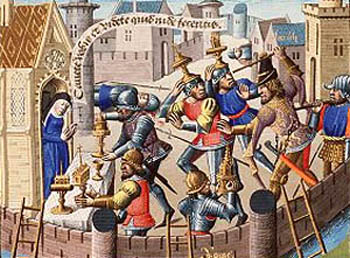(Yet another essay for my school paper, the Volante. Find the published version here.)
Reading Matt Hittle’s column last week, I found myself nodding in agreement. Writing and speaking well are valuable skills, not only in the business of passing exams, but in the businesses of the world outside these college walls as well. Unfortunately, they are also skills to be had at a premium among many college students. However, I believe that being able to write and speak well are important for other reasons as well.
In his seminal essay “Politics & the English Language”, George Orwell argues that sloppy writing is reflective of sloppy thinking. Although the essay was written in 1946, Orwell’s thesis remains valid today, perhaps in the current age of Twitter more than ever.
Allow me to use a metaphor familiar to many college students to illustrate Orwell’s point. When I pour a can of condensed soup into a saucepan, lurking amidst the amorphous chunks of potato and reprocessed meat lumps may be a host of preservatives and trans-fats of which I am totally unaware. If I had read the label carefully, I would have known all about the soup’s nefarious contents. But I was too lazy to do so, and now all those nasty chemicals are going into my body.
So it is with writing. Take a common word like “democracy”. Most of us would probably agree that democracy is a good thing, that our political system is democratic to one degree or another. But what precisely does democracy mean on an etymological level? On a practical level? Does it just have to do with elections? With the rule of law? Is capitalism a necessary part of democracy? Does it mean the same thing as “freedom”? If not, why not?
These are all important questions. Yet many people uncritically use democracy as a catch-all, without considering what it is they might actually be saying. And if we do not really understand our own words, how much more difficult is it for others to understand us?
That is not the end of the story though. “If thought corrupts language,” Orwell wrote in 1946, “language also corrupts thought.” To use another metaphor, if you want to become a professional accordionist, you cannot practice diligently every once in a while and muddle through the rest of the time. You must practice diligently every day. If you leave off practicing for, say, six months, when you return to the instrument, you will have to work twice as hard now to bring your skills back up to snuff.
So also language. When we allow ourselves to indulge in poor writing, we not only dull language’s usefulness in communicating with our fellow human beings; we dull our own ability to think critically and meaningfully about the concepts language expresses.
This insight was the basis of Newspeak in Orwell’s classic 1984. By trimming down English to a few hundred words and reducing complex notions to mere slogans, Big Brother used language itself to destroy people’s critical thinking skills and, thus, their capacity for resistance. By forbidding people from talking about things, the government forbade them, in a very real way, from thinking about them.
In this age of instant messaging especially, we have become our own Big Brother. Our digital conversations consist of monosyllables punched mindlessly into a cell phone keypad, if they consist of words at all. The fact of the matter is that critical analysis is not so easy when we confine ourselves to 140 characters. When even our politicians – people we expect to have thoughtful discussions, seeing as how they are running our country and all – begin to Tweet, we know something has gone drastically wrong.
By using muddy, unthoughtful language, we become muddy, unthoughtful thinkers. And when that happens, it becomes all too easy for others to use language to manipulate and dominate us. When we force ourselves to write well, on the other hand, we force ourselves to really think about what we want to say. We become not just better potential employees (although that we do become), but better citizens and better people as well.














